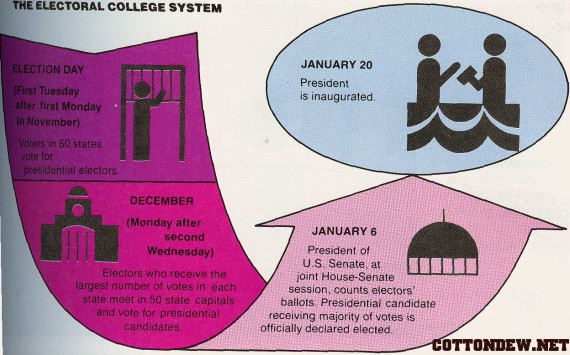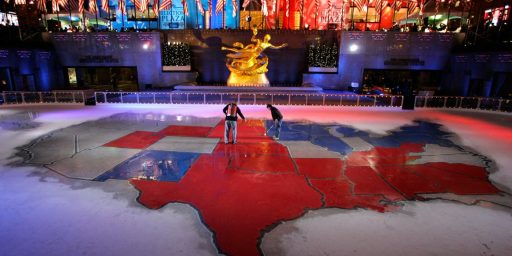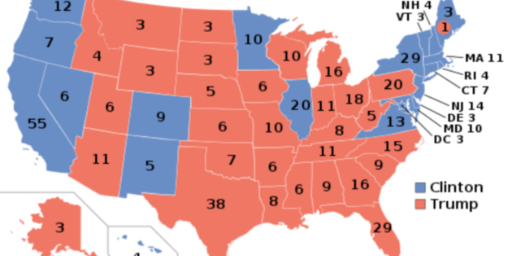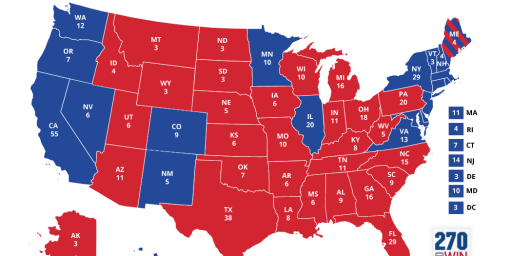New York Becomes 11th ‘State’ To Pass National Popular Vote Law
New York has joined nine other states and the District of Columbia to vote to for an Electoral College bypass.
New York has joined nine other states and the District of Columbia to vote to for an Electoral College bypass.
Daily News (“New York joins campaign to end Electoral College role in presidential elections“):
New York has joined the campaign to effectively end the Electoral College’s role in determining winners of presidential elections.
Under the National Popular Vote Compact, which Gov. Cuomo signed off on Tuesday, the state has agreed to award its electoral college votes to whichever presidential candidate wins the national popular vote.
Currently New York’s electoral colleges votes go to the winner of the state’s popular vote.
The Senate and Assembly approved the legislation last month.
The compact only takes effect once enough states have signed on to give it the required 270 electoral college votes. With New York’s participation, the movement has 165 votes.
“With the passage of this legislation, New York is taking a bold step to fundamentally increase the strength and fairness of our nation’s presidential elections,” Cuomo said.
Hendrik Hertzberg is excited:
As I’ve explained many times (fifty-one, to be exact), N.P.V. is a way to elect our Presidents the way we elect our governors, our mayors, our senators and representatives, our state legislators, and everybody else: by totting up the voters’ votes—all of them—and awarding the job to whichever candidate gets the largest number. And it does this without changing a word of the Constitution.
Impossible, you say? No. Quite possible—even probable—and in time for 2020, if not for 2016.
Here’s how it works: Suppose you could get a bunch of states to pledge that once there are enough of them to possess at least two hundred and seventy electoral votes—a majority of the Electoral College—they will thenceforth cast all their electoral votes for whatever candidate gets the most popular votes in the entire country. As soon as that happens, presto change-o: the next time you go to the polls, you’ll be voting in a true national election. No more ten or so battleground states, no more forty or so spectator states, just the United States—all of them, and all of the voters who live in them.
Unless you’ve been following this pretty closely, it will surprise you to learn that, before this week, ten states (counting D.C.) had already signed on. Now it’s eleven, and between them they have a hundred and sixty-five electoral votes—sixty-one per cent of the total needed to bring the compact into effect.
The evidence that enough additional states will sign off by 2020, much less 2016? Well, none. As AllahPundit notes,
All the states to have joined so far are very blue. Until some purple states and red states sign on, the compact has little in the way of territory to conquer…
Perhaps the compact can get Delaware, Connecticut and Maine to join, where Obama also won by 15 percentage points or more. But they account for only 14 total electoral votes (and Maine already has a unique way of apportioning electoral votes). Oregon and New Mexico also re-elected Obama by double-digit margins — and those two states have become increasingly off-limits to Republican presidential candidates — but have just 12 electoral votes between them.
After that, you get into states such as Michigan and Minnesota, which are blue-leaning but that receive plenty of attention from presidential campaigns. Their votes might not be quite as influential in the Electoral College as the campaigns presume — a Democrat who lost Minnesota would probably be in too much trouble elsewhere to cobble together a 270-vote majority. Still, they receive an influx of media dollars and political pandering every four years, and probably have little incentive to bite the hand that feeds them.
Soon after comes outright swing states, such as Ohio, New Hampshire and Colorado. These states, along with Florida, Virginia, Nevada, Iowa, Wisconsin and Pennsylvania, collectively had a 98.6 percent chance of determining the Electoral College winner in 2012, according to the FiveThirtyEight tipping-point index as it was calculated on election morning. In other words, these nine states are 70 times more powerful than the other 41 (which collectively had a 1.4 percent chance of determining the winner) combined. That’s part of the reason so many Americans object to the Electoral College. But states whose voters have a disproportionate amount of influence may be in no mood to give it up.
Still, while unsure whether electing presidents by popular vote will help or hurt Republicans—but suspecting the latter—AllahPundit supports the change:
In any given election, one party or the other can have an advantage based on the vagaries of the leanings of a few swing states. Republicans used to have an edge, but in recent elections, pundits like Nate Silver of 538 convincingly argue that Democrats have had an edge. The 2016 race, however, is anyone’s guess. We know that there will be a distortion — but we don’t know who it will help…
Nothing would be better for restoring Americans’ faith in their elected officials if those officials made it clear that voters and their democracy come first. Our political leaders should be willing to allow fair completion and encourage high participation in exchange for earning the consent of the governed as intended by our Constitution.
While I’m sure the OTB gang combined falls short of Hertzberg’s total of 56, we’ve written about it multiple times over the years going back to my piece from almost exactly seven years ago titled “Abolishing the Electoral College by Stealth.” As I noted then,
Technically, there is nothing extra-constitutional about NPV. The Constitution gives state legislatures absolute authority to allocate their Electors as they wish. Indeed, in the earliest days, they simply appointed Electors with instructions to vote for a specific presidential and vice presidential candidate. It was decades before the westward expansion created a groundswell for elections.
What evolved was really a bastardization of the Electoral College. Rather than the state legislators appointing delegates, they simply rubber stamped the election results and handed the power over to a slate of delegates chosen by the winning political party. And Electors are free to vote for whomever they chose. As recently as the 2000 election, a faithless District of Columbia Elector denied her vote to Al Gore out of pique, rubbing additional salt into his wounds. Further, two states, Maine and Nebraska, have a hybrid system wherein two Electors (matching the Senate delegation) are awarded to the at-large winner in the state and the others are awarded to the winner in each of the congressional districts.
So, the NPV system is perfectly constitutional. Essentially, state legislators agree to award their Electors to the national popular vote winner once enough states have made the same agreement to provide 270 Electoral Votes. Until then, their current allocation method-or a substitute one of their own chosing-would remain in effect. There is simply no question that they have the right to do this.
In terms of the partisan impact:
It is not at all clear that shifting plans advantages one party or the other. For one thing, it takes an incredible confluence of events for a candidate to win the necessary 270 Electoral Votes and not also be the plurality winner in the national popular vote. Indeed, George W. Bush in 2000 is the only man to do so in the modern era. We came reasonably close a few other times, as shifts of a few thousand votes in a handful of states could have reversed the outcome in 1960, 1976, and 2004.
Sure, the proposed system would have handed Al Gore the presidency in 2000 but many of us thought that the opposite outcome, Bush winning the popular vote but Gore winning the Electoral vote, was quite possible. After all, the Democratic candidate currently is virtually assured of all of California’s massive Electoral slate. On the other hand, the current system would have given Kerry the win had he won another few thousand votes in Ohio, even though Bush’s national margin of victory was quite comfortable.
Changing demographics will also alter the game in ways there are not entirely clear. The massive influx of Hispanics changed California from a solid Republican to a solid Democrat state. Florida is becoming bluer by the day owing to both an increasing non-Cuban Hispanic population and the migration of retirees from Blue States. And even the Deep South, especially the Carolinas and Georgia, are unlikely to remain safe Republican for long. Then again, other factors could make states that are now safely Blue turn Red.
Since writing that, formerly solid red states Virginia and North Carolina have voted Democrat for two presidential cycles. Texas is turning bluer, too.
Regardless, the very notion that we should be thinking of presidential elections in terms of marginal changes at the state level strikes me as incredibly anachronistic. While we remain a federal system in very real ways, most of us think of ourselves as Americans first and residents of our states second, if at all. So, I support electing presidents via a national popular vote.
Would I prefer abolishing the Electoral College outright via Constitutional amendment rather than bypassing it through stealth? Yes. But that’s an awfully high, probably unachievable, hurdle. Not only do most Americans care too little one way or the other about the process to create a groundswell—if it didn’t happen after the highly charged controversy after the 2000 election, it’s not gonna happen—but there are strong incentives for swing states to prefer the current model. Given that this move is perfectly legal and no more of a bastardization of the intent of the Framers than the current system, I’m fine with the workaround.






I guess I shouldn’t be surprised. In theory there’s no reason why NPV should be a partisan issue, but it will be as long as people remember the 2000 election and no comparable disaster happens to the Republicans. There was a point in 2012 when Romney was leading in national polls but trailing in battleground-state polls, and I remember some Republican friends bemoaning the electoral college at the time. If Obama had gone on to lose the popular vote but win the election, that might have helped break the red-state opposition to this initiative. The problem is that an electoral/popular split is so rare (it’s only happened two other times in American history, both in the 19th century) that the 2000 fiasco was probably a fluke, not the beginning of a trend.
Article I, Section 10 of the Constitution prohibits interstate compacts without Congressional approval. In any event, without a “higher law” status, states are free to move in and out of this variant system.
@PD Shaw: This isn’t really an interstate compact. Each state is passing the law on its own merits, with the kick-in proviso simply being that sufficient other states independently do the same thing as to guarantee the election to the national popular vote winner. There’s no reason this wouldn’t stand constitutional muster.
As soon as the Democrats hit a blue wall number above 270 electoral votes, I doubt that they will care any more about NPV anyway.
A better place for reform is changing the way that the Democrats conduct their presidential primary season. If the same candidate wins the Iowa Caucus and the New Hampshire primary, they will be almost guaranteed of being the next president. Instead of worrying about the irrelevant Republicans having to campaign in Ohio and Indiana, why not worry about the out-sized influence that Iowa and New Hampshire have in selecting the next president.
One of the goals of NPV is to force the candidates to appeal to California and New York. But does anyone really believe that the candidates will pander to the deep blue coastal states if the Democratic Primary is the real election and the general election is just a rubber stamp election?
A truly horrible idea. Can you imagine the amount of money it would take to mount a true 50 state campaign? If you think money has a corrupting influence on our political system now….
The more likely result of this would be Democrats concentrating all their efforts trying to wring as many votes as possible out of blue states while Republicans do the same in red states, further polarizing the country and making candidates more extreme as they pander to their base voters.
@James Joyner: So the National Popular Vote Interstate Compact could never be interpreted as an interstate compact?
Constitutionality is a matter of reasonable dispute.
“If voting made any difference they wouldn’t let us do it.”
― Mark Twain
@Jack:
Classic Twain, although a guy like H.L. Mencken could have said the same.
Kind of begs the question though: Why do we care so much about the differences between, say, Bush and Gore? Since the 2000 election I do not hear nearly as many (cynical) people people say that voting does not matter.
@superdestroyer:
Ignoring SD’s normal blather, he actually does bring up a very important point. I’ve always hated that Iowa and NH have such an unbelievably out-sized influence on both party primaries. Arguments from tradition hold absolutely no sway with me, and there is no logical reason for these two states to have such immense power.
An interesting counterfactual is what would have happened in 2004 if Kerry had won Ohio but lost the national election. Two back-to-back elections where the EC threw it and the second election against the contingent that’s most skeptical of going against a national popular vote.
That’s almost the perfect scenario to get rid of the EC.
Instead, we have the 2000 election where the EC favored the party that tends to support the EC (even pre-2000) and against the party that tends to disfavor it (even pre-2000). Which makes it a partisan issue, making it pretty difficult to bring the red states on board.
@Ben:
One of the reasons behind NPV is to get candidates to actually campaign in California, New York, and Illinois. However, the Democratic Primaries in those states come so late that they have zero influence on who the Democratic Party nominates.
It would make much more sense for the Democrats to rearrange their primaries to give more influence to the deep blue states like California rather than mess with the general election at a time when the Democrats are on the edge of having a lock on more than 270 electoral votes. See
from http://www.washingtonpost.com/opinions/george-f-will-the-gop-faithful-should-give-jeb-bush-a-hearing/2014/04/02/c29a66f2-b9be-11e3-96ae-f2c36d2b1245_story.html
Under this popular vote standard, four more Democrats including Al Gore would have been president, and four less Republicans would have been president. Small states with a Republican leaning electorate like Wyoming have their votes disportionally weighed against larger states. Some small states 166,000 voters equal one electoral vote, while hundreds of thousands of voters in some larger states equal one electoral vote, because even the smallest state receives at least one vote for each representative as well as for two senators. This system is unfair to larger population states because of disportionate strength of small states in this process.
In a related matter …
Here in California there may well be a statewide ballot initiative, sponsored by a wealthy Silicon Valley guy (Tim Draper), asks voters to divide California into 6 new states.
So, instead of one Blue State, we would have 3 new Red States and 3 Blue States. The populous areas would be Blue States and 2 of the Red States would be low population areas that now are subsidized by populous Blue State areas (interesting, how very analogous to the rest of America).
Setting aside the federal issues (amending everything to set this up) isn’t this this is just what we need, more low-population states with 2 senators and disproportionate influence in our Congress?
@Paul Hooson: That’s almost technically true (I say “almost” because no Republican was going to win in 1824), but a bit deceptive insofar as in the Tilden-Hayes race and Harrison-Cleveland races, it was before modern realignment and the electoral maps were reversed. It was the Party of the South that was “screwed” in those elections and the party of the Northeast that was the beneficiary.
I’m not sure I’m a fan of this, and this is coming from someone who thinks Katherine Harris and Jeb Bush should be investigated for elections fraud. The whole purpose of the electoral college was to make sure to avoid the tyranny of the majority. There are very different, very real geopolitical differences between certain northern states (heavily populated states like NY, CA, etc.) and their southern counterparts.
I’d have to be further sold on this idea, put it that way.
@Christopher Bowen: I am far from an expert on this subject, and I urge you to read as much as you can of Hendrik Hertzberg’s writings on it. In brief: Any defense of the EC based on the purported “wisdom of the Founders” is probably nonsense, first because the Founders didn’t all support the EC (which was itself a compromise), and second because today it works nothing like the Founders envisioned. The original idea was that the college would be a body of representatives, not necessarily elected by individual citizens (in many states it was the legislatures who voted for electors), who would come together and independently choose a president. The Founders created this system without anticipating the emergence of political parties, or the gradual weakening of the states (Thomas Jefferson referred to Virginia as “my country,” and the term United States was originally plural). Even then, it worked so badly at first that they had to create a new amendment (the 12th), little over a decade after the Constitution’s ratification, just to make it workable.
As Hertzberg has explained, the biggest problem with the EC isn’t that it can lead to situations like 2000 or 1876 where the popular-vote winner is denied the presidency–though that is certainly a problem. The biggest problem is that it has a profound impact on the way candidates campaign in every presidential election, where they pick a few “battleground” states and ignore everywhere else, effectively disenfranchising most of the country.
It is one thing to protect against the tyranny of the majority, as the Bill of Rights does; it is quite another to create tyranny of an arbitrarily defined minority.
@Paul Hooson: As @trumwill notes, the Republican Party didn’t exist in 1824; it didn’t field a presidential candidate until 1856. The 1876 and 1888 elections were incredibly tainted.
Thankfully, we’ve only had one modern election–2000–in which the popular vote winner lost the electoral vote. But we came pretty close in 1960, 1976, and 2004. In three of those four cases, the Electoral College system benefited my preferred candidate. But my general preference is nonetheless to have the American people, not the several states, chose their president.
Our Founding Fathers never wanted the public to be able to determine our leaders hence hence the Electorial College. They say they did it to not allow large population centers ie large cities determine the nations leaders because it would take away from smaller states..Well why should small states with no population have an equal say over the majority of the country? That is nonsense. Give it an overall vote and let all the voters decide. The Electoral College was a ploy our founding fathers who happened to be OLIGARCHS in their time and wanted to control the masses. So today when anyone challenges the Electoral College system then the attack dogs go out because it challeges the status QUO which happen to be the OLIGARCHS like the Koch brothers and all the Elite in the US. This popular vote trend needs to succeed in dethroning all this control over our system..
@Jim M: The Framers didn’t intend for the citizens to have an y direct say in who would be president, period. The Electors were to represent the states, specifically the state legislatures. But nobody would stand for that today; it was already out the door by the time Andrew Jackson was running for president.